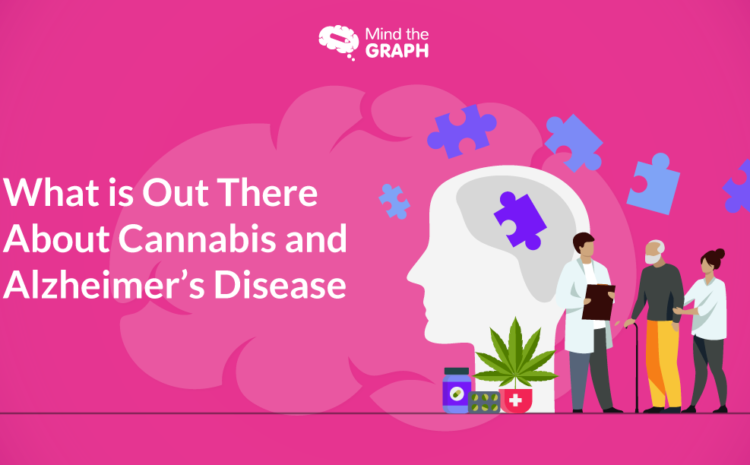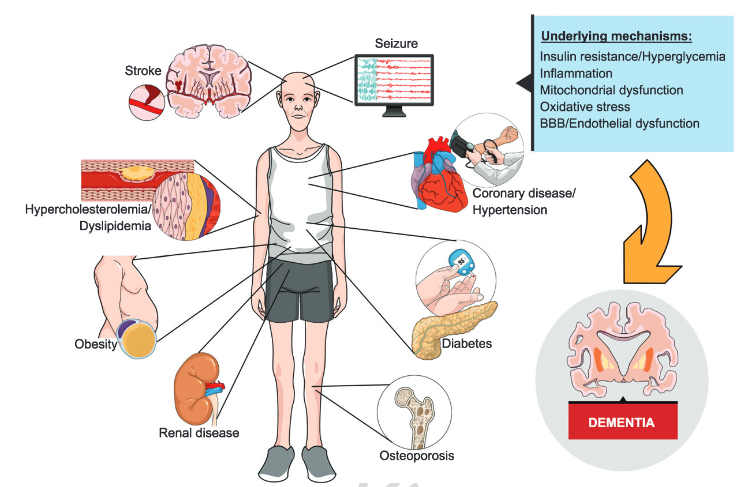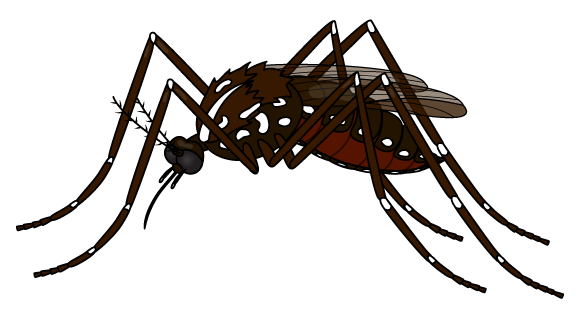Alzheimer’s disease (AD) is a neurodegenerative disease responsible for more than 50% of dementia cases diagnosed currently, and it is directly correlated with aging. Nowadays 40% of people with more than 85 years have some level of dementia.
Previously thought, AD symptoms were just related to a cognition function decline affecting short-term memories, while in advanced stages of the disease, affecting patient’s language abilities and even long-term memories.
However, today is known that patients suffering from AD show a number of other symptoms like depression, psychosis, aggressive behaviors, which makes the disease even worse.
In recent years, researchers and doctors have reported in their studies positive results when starting to treat their AD patients with cannabis-based drugs achieving symptom relief.
The endocannabinoid system has become an alternative approach for treatment of different diseases and pathologies, apart from its influence in several processes like neuroplasticity, neuroinflammation, behavior disorders, sleep regulation, immunological functions, inflammatory diseases, cardiovascular functions, pain, motor control, energy balance and appetite.

Unfortunately, there are still few numbers of official studies that analyze directly the relationship between the endocannabinoid system and AD.
Today is well known that AD is caused by genetic and aging factors. Key culprits of the illness are attributed to the senile plaques and the neurofibrillary tangled.
An interesting fact is that using AD rat models researchers discovered that AD brains have a lower number of CB1 receptors when compared to healthy brains – fewer CB1 receptors may eventually decrease the drug therapeutic effect.
Cannabinoids treatment can produce a protective effect against oxidative stress and neuroinflammation in the brain of patients with Alzheimer’s disease, helping to reduce the formation of amyloid plaques and neurofibrillary tangles – retarding the cognitive decline of patients.
Although amyloid plaques could be also found in healthy brains, their frequency is extremely lower in comparison with AD brains.
Studies dedicated to understanding why cannabinoids have a therapeutic effect on AD patients discovered that the THC molecule has the capacity to increase the bioavailability of a neurotransmitter called acetylcholine (Ach) by inhibiting its degradation enzyme acetylcholinesterase (AChE) – Ach is essentially responsible for repassing the nerve impulse to the next neuron.
The enzyme AChE in a healthy brain has the role of breaking down Ach, however, is a brain with Alzheimer’s disease the enzyme is highly present, degrading much more Ach than it is supposed to do, causing a decline of brain cognition function over time.
Researchers reported that cannabinoids may help due to its inhibitory action of the enzyme AChE – it has demonstrated better responses than other commercially available drugs.
THC can also help to reduce behavioral disorders and regulates the circadian cycle of patients with severe dementia. Some scientists even affirm that THC and CBD cannabinoids have the potential to be anti-Alzheimer’s therapies.
An article published in 2015 in the Clinical Pharmacology and Therapeutics journal, provides an overview of the potential of cannabinoids in the treatment of late-onset Alzheimer’s disease and related neuropsychiatric symptoms in elderly people, discussing also aspects of cannabis-based medicines in matters of its efficacy, safety, and pharmacokinetics.
A 72-year-old man with Alzheimer’s disease had a behavioral disorder like agitation and aggressiveness. His previous treatment showed no significant improvement.
When the patient was introduced to Nabilone – a synthetic THC drug – he soon demonstrated improvement in his behavioral disorder and other symptoms, in addition, he had no adverse effects during the treatment with THC base-medicine.

Another study group composed of fifteen patients with Alzheimer’s disease – the average age of 72 years – showed before the treatment behavioral disorder and issues for eating.
The fifteen patients were treated for six weeks with dronabinol – also known as Marinol – a synthetic THC drug.
They presented after a period of treatment an improvement in behavior, weight gain, and a decrease of agitation – when compared to placebo. Some adverse effects were noticed such as tiredness, drowsiness, and euphoria, all have confirmed to be associated with dronabinol.
Another group of six patients, average age of 81 years, some with AD and others suffering from severe dementia, started a two weeks treatment with dronabinol.
The results showed a significant improvement in the nocturnal motor activities of these patients and better behavior. In this group, no adverse effects were observed.
In another study group of 40 patients with different levels of dementia and with 13 of them with Alzheimer’s disease.
All were introduced to the treatment with dronabinol to treat behavioral issues and appetite disorders.
The treatment period was 17 days, and patients improved in both aspects. Adverse effects as sedation, delirium, urinary tract infections, and confusion were reported but according to researchers, these were not directly associated with the use of dronabinol.
Despite several studies, results showing positives outcomes using cannabinoids in the treatment of patients with dementia, some researchers claim that there is still not sufficient evidence to prove that cannabinoids are really good and safe in treating behavioral disorders and dementia.
Anyway, researchers have increasingly reported the use of cannabis-based drugs to treat patients with AD, and not only that, it also has been used in treatment of Parkinson’s disease and autism, with doctors and scientists reporting improvement of their patient’s quality of life after started taking cannabis-based drugs. But, it is a topic for the next article.
___
Are you from the neurology field? In Mind the Graph there is a big neurology illustration category where you can find everything you need for your neurology paper or presentation. Check out here.
Or you are looking for biochemistry and molecular biology illustrations you can also find in Mind the Graph.
And we are here to help you if you need anything else, just login into your account and send us a message in the REQUEST AN ICON.
References
AHMED, A. I. A. et al. Cannabinoids in late-onset Alzheimer’s disease. Clinical Pharmacology & Therapeutics, v. 97, n. 6, p. 597–606, 2015.
AHMED, A. I. A. et al. Cannabinoids in late-onset Alzheimer’s disease. Clinical Pharmacology & Therapeutics, v. 97, n. 6, p. 597–606, 2015.
BALASH, Y. et al. Medical Cannabis in Parkinson Disease: Real-Life Patients’ Experience. Clinical Neuropharmacology, v. 40, n. 6, p. 268–272, dez. 2017.
BENITO, C. et al. The Endocannabinoid System and Alzheimer’s Disease. Molecular Neurobiology, v. 36, n. 1, p. 75–81, 1 ago. 2007.
DE FARIA, S. M. et al. Effects of acute cannabidiol administration on anxiety and tremors induced by a Simulated Public Speaking Test in patients with Parkinson’s disease. Journal of Psychopharmacology, v. 34, n. 2, p. 189–196, 1 fev. 2020.
FALCO, A. D. et al. DOENÇA DE ALZHEIMER: HIPÓTESES ETIOLÓGICAS E PERSPECTIVAS DE TRATAMENTO. Química Nova, v. 39, n. 1, p. 63–80, jan. 2016.
LEEHEY, M. A. et al. Safety and Tolerability of Cannabidiol in Parkinson Disease: An Open Label, Dose-Escalation Study. Cannabis and Cannabinoid Research, 19 mar. 2020.
POLEG, S. et al. Cannabidiol as a suggested candidate for treatment of autism spectrum disorder. Progress in Neuro-Psychopharmacology and Biological Psychiatry, v. 89, p. 90–96, 8 mar. 2019.YOO, K.-Y.; PARK, S.-Y. Terpenoids as Potential Anti-Alzheimer’s Disease Therapeutics. Molecules, v. 17, n. 3, p. 3524–3538, mar. 2012.

Subscribe to our newsletter
Exclusive high quality content about effective visual
communication in science.




